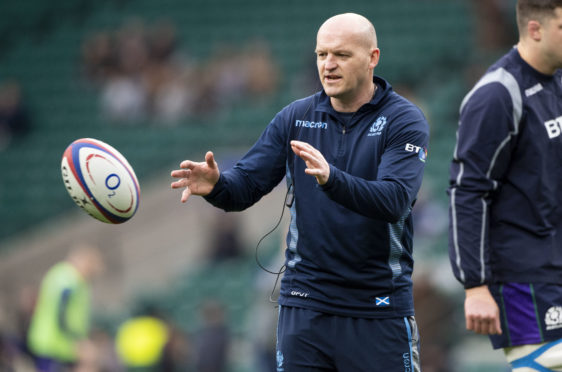The Calcutta Cup itself is some limited but tangible reward for Scotland’s players despite the crushing disappointment of seeing their unparalleled comeback at Twickenham fall just short, but Gregor Townsend believes it shows his team can “do special things”.
Scotland’s 38 points without reply to come back from 31-0 down after just over half and hour’s play at Twickenham is without precedent in international rugby, far less the Guinness 6 Nations, even if George Ford’s final exclamation point to draw on one of the greatest games ever played “got us out of jail” in England head coach Eddie Jones’ words.
Scotland have struggled away from home in the 6 Nations for some time so Saturday’s comeback could even be cathartic in finally taking their better Murrayfield form on the road. It could even be a re-defining moment for the squad with the World Cup in Japan in September, after what had been a desperately disappointing championship campaign.
“I hope so,” he said. “It showed when we get things right – and that could be system, in effort, in communication, in belief – then we can do special things.
“It showed the fitness of our players. The last two weeks we’ve played better in the second half than the first half and that shows that in the tough environment we play in that the players can dig deep and still take the game to the opposition.
“It also shows that we have good depth. We obviously have had to play (more) players this year for a number of reasons, but they’ve got experience of the 6 Nations now.”
The coming of age at Twickenham of the likes of Darcy Graham, Magnus Bradbury and Sam Johnson, among others, could only be good for the rest of the year, he agreed.
“Obviously we believe that with everybody available and recovered from injury, we’ll be stronger,” he said. “You never know what happens in the summer but it’s likely we’ll have fewer injuries than we have had halfway through the season.
“It makes things more difficult selecting an initial squad and a final squad for the World Cup because there are players who have played really well for us in the last two or three weeks and they are going to be competing against players who have played really well for Scotland in the last two or three seasons.”
Saturday’s biggest reward for the coach was seeing the team’s faith in the fast, open game he has preached being so effective even with their backs to the wall, to the tune of five second-half tries against one of rugby’s best defences.
“I’m not going to watch the game for a few days,” admitted the head coach, who said he did think of the worst after his side were taken apart by a rampant England in the first half.
“(England) probably could have scored a couple more tries, and you inevitably think that if we don’t improve it’s going to be a similar scoreline in the second half or at least it’s going to be two or three more tries.
“It’s a tough thing to do to go back out knowing that the team you’re playing against is on fire, running hard on to the ball, getting off the line in defence, and with the scoreboard and history against us.
“But the team didn’t lose faith, didn’t give in and went at the opposition, was great to see. At (half-time) we were thinking that if we showed a true picture of ourselves and get a couple of tries and maybe keep them try-less, that would be a positive achievement to move on to the World Cup.
“But what they did was amazing. 38 unanswered points, 31 in the second half, that was a real credit to them and showed what they are capable of.”


